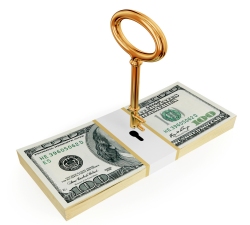
You probably have a general idea of what bail is: money you pay to get out of jail. However, there is much more to bail than that. Eligibility, costs, payment options and other requirements all come into play.
If you or someone you know has been arrested, it is important to have a thorough understanding of the conditions surrounding bail in order to avoid further complications to your legal situation.
What is Bail?
To put it simply, bail is the fee you must pay to be released from jail after you've been arrested. Wisconsin Statute 969.001(1) clearly defines it as "...monetary conditions of release."
Remitting this monetary amount is commonly referred to as posting bail or making bail.
How is Bail Determined?
After an arrest in Wisconsin, you will appear in front of a judge. This initial court appearance is known as an arraignment or bail hearing.
It's at this hearing that a judge will determine if you are eligible for bail. The judge will consider the charges you're facing and any prior convictions you might have on your criminal record before deciding whether or not to allow or set bail in your case.
If the judge decides you are eligible for bail, he or she will then determine the amount.
 How Much Does Bail Cost?
How Much Does Bail Cost?
There is no set formula for bail amounts in Wisconsin. How much bail will cost is up to the discretion of the judge.
The United States Constitution explicitly prohibits excessive bail, and Wisconsin law also provides protections for defendants against unreasonable bail. Some courts follow specific formulas for setting bail for certain alleged offenses, but not all judges do so. Bail can be anywhere from a few hundred dollars to $1 million or more. The amount set should be based on different considerations, including:
· The severity of the alleged offense
· The degree of the defendant’s flight risk
· The defendant’s ability to pay
What other Bond Conditions Can Be Imposed?
Paying cash is not the only possible condition of release on bond. When determining bail, a judge may also set additional requirements for a defendant to meet in order to remain in the community until their case is resolved. Some other conditions may include:
· Wearing a GPS monitor
· Abstaining from drug or alcohol use
· Not leaving the jurisdiction without court permission
· Not having contact with an alleged victim of the crime
· House arrest
Judges have discretion when it comes to the particular conditions of a specific case. Wisconsin law requires the conditions to be “reasonable,” and within those confines, the judge can set conditions based on the nature of the case and the defendant’s circumstances.
 Is there Bail in Every Case?
Is there Bail in Every Case?
No. Chapter 969 of the Wisconsin statutes govern the imposition of bail. Under the law, before a person is convicted, he or she is eligible for release under reasonable conditions. Importantly, there are certain exceptions to this rule, including when a person is accused of first-degree homicide, certain sexual offenses, or the person has been convicted of committing or attempting to commit a violent crime and is accused of committing or attempting to commit a violent crime.
The law only allows judges to impose bail if the court determines that there is a reasonable basis to believe that bail is necessary to ensure that the defendant appears in court. If the court decides to impose bail, it should only be in an amount found necessary to make sure the defendant comes to court.
What if I Can’t Pay Bail?
If you cannot pay bail, the first thing you should do is contact an experienced attorney familiar with handling matters related to pretrial release. An attorney will review the facts of your case and determine whether there are any arguments in favor of having your bail reduced or eliminated completely. Examples of arguments that an attorney may make include:
· Bail is not appropriate or necessary in your case based on your ties to the community,
health, or other factors.
· The amount of bail set by the judge is too high in light of your income and means
· The judge incorrectly applied the law in regard to circumstances in which a defendant is
not eligible for release
The first thing you should do after you get out on bail in Wisconsin, is consult a skilled criminal defense attorney to help ensure your next actions are in the best interest of your defense and your freedom.
With decades of experience the team at Jones Law Firm is here to help. If you are someone you know has questions about bail or is need of any legal help, contact us today to set up a free consultation. Please contact us by text or phone at (414) 775-7445 or email at laura@jlfwisconsin.com anytime.
*Any articles in the Libra or posted by Jones Law Firm LLC are not legal advice for a particular client or situation. Further no attorney-client relationship is intended or created with this post.*

